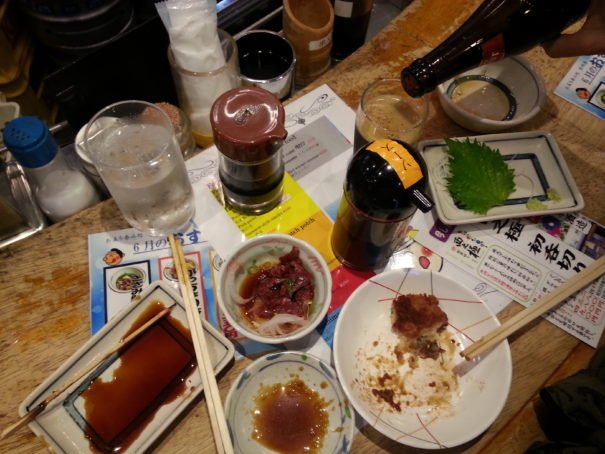
Always a Surprise When the Horse Meat Is Raw

Always a Surprise When the Horse Meat Is Raw
Uma in Osaka
It was 10 in the morning when Rebekah and I searched for breakfast in Osaka’s narrow alleys on the first day of our honeymoon. We passed workers stacking yellow Asahi crates into the backs of trucks and men unloading vegetables, and slipped into a promisingly cramped corner joint.
Except for one woman, every bit of counter was taken by men. They stood. They drank beer. They stared into space while sucking on cigarettes like it was their only source of oxygen. Despite the smoke, the place was bright and festive, filled with sunlight and laughter.
“Irrashaimase!” called one of two bartenders. He motioned us toward a gap where we could squeeze in. The bar had no chairs or stools, just one long counter that wrapped around a small central kitchen, and a few tiny table tops suspended from the wall. Who needs to sit where you’re just popping in for a beer or three? It reminded Rebekah of coffee shops in Italy.
A man in a fur-lined hat, apparently oblivious to the summer heat, nodded hello at us. The lone woman said good morning. A group of three men on the other side laughed red-faced laughs, leaning on each other’s shoulders and smacking each other’s backs. Two fought over the check, but the bigger guy won.
Rebekah whispered, “Are the bars as friendly in Tokyo?” Probably many, I whispered back, but on average, not like this. Osaka has a different heart.
The English menu included a fraction of what the wooden panels on the wall offered in Katakana. We pointed and ordered the Japanese names we knew: maguro, croquette, ikayaki, age-dashi, and the bartender brought a bottle of Kirin Stout. He thought Rebekah said ‘dark,’ not ‘draft.’ It tasted better than most Japanese mass market beer, though. Lesson learned: Order dark.
A man in a suit came in, read the newspaper, drowned a beer, then left. He spent most of his time folding and refolding the paper to take up less space and keep it close to his face.
When the waiter set a bowl of red meat in front of a diner, I asked what it was. “Uma,” the diner said.
The waiter looked at him and looked at me. “Uma, eto─” He searched for the English word, then brayed, clicked his tongue and moved his hands like he was trotting.
“Oh,” I said, “horse!”
“Yes, yes,” the men said, “horse.”
I held up one finger. “I’ll have one, onegai shimas.” The diner flashed a thumbs up. Two old timers across the counter stared at me and nodded.
The weathered man next to me muttered one word in Japanese, over and over, trying to tell me something maybe about what I’d done, or what I could expect of the taste, but I couldn’t understand, and when I leaned close and tried to follow up, he just muttered the same word. Finally, his eyes drifted downward as he picked at age-dashi.
The horse arrived quickly, with a tiny raw quail egg on top meant to be mixed in. It was tasty, like beef soaked in shoyu, garlic and onion, but more novel than remarkable. It was also raw, which I didn’t expect.